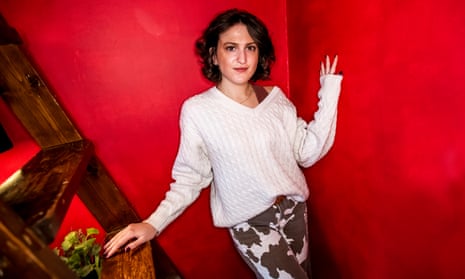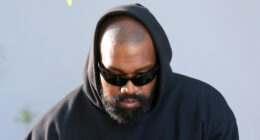How Emily Wilson turned her teenage X Factor humiliation into comedy gold

A brutal take-down on the TV talent show led Emily Wilson into therapy. A decade later, she has turned her grim experience into award-winning standup
It’s not that Emily Wilson used to be secretive about the fact that, as a teenager, she’d appeared on the American incarnation of the X Factor. Rather, it hadn’t exactly gone well for her – awfully, actually – and by the time she was a 20-something comedian carving out a career in New York City, it was a period of her past she was desperate to forget.
To say she’d totally buried the memories, Wilson reckons, might be overly dramatic. “It’s more that I knew it was shitty, and that it impacted me,” the 26-year-old explains over Zoom from her Upper West Side apartment. At 15, she’d appeared on the TV talent show, was treated brutally, had her dreams crushed yet was dragged further into the competition’s gruelling rounds. It’s fair to say a path to pop stardom wasn’t forthcoming. “It was total humiliation,” she says, “so I tried to put it in a box and never go back to it.” If the topic came up in conversation, Wilson would shut it down – “Yeah, it was crazy;” “I know, right?” – giving stock answers to end it. “It was to the point that only eight months into therapy did I first mention it,” says Wilson. Unsurprisingly, her therapist believed it warranted a chat.
Wilson would have been the last person, therefore, to predict that she’d ever mention the whole grim experience on stage. Let alone write and perform in a painfully funny, honest and exposing one-woman show about her time on the programme – archive video clips and all. In Fixed, soon coming to London’s Soho Theatre, that’s precisely what Wilson has done – and to huge critical acclaim.
“I genuinely didn’t know if I’d be able to even talk about it publicly at first,” Wilson explains. “I was still really embarrassed and mortified.” She knew there was trauma there, but she’d never attempted to explore it. “When you bury a childhood experience down as a kid, you don’t process it. When it comes up, you still feel the same raw emotions you did back then.”
From her New Jersey childhood home – only 45 minutes from New York City – Wilson could see the Big Apple’s imposing skyline. “I was a real YouTube kid,” Wilson says. “I loved to sing and dreamed of being famous. I was very much a child of the 90s.” As a young teenager, she formed a duet with best friend, Austin. “We called ourselves Ausem,” she says. “We sang all the time. And I was in love with him, but he was gay. I know… Tragic! Classic!”
In 2011, when both Ausem members were aged a tender 15, the X Factor circus came to town to hold auditions. An opportunity to perform on national TV? The young duo were desperate. “There were three stages before you got in front of the judges,” Wilson recalls. “The producers loved us. At least, that’s what they were saying. They were complimenting us all the time, huge smiles on their faces.”
Wilson believed her dreams were on the cusp of coming to fruition. “Maybe we really were this brilliant duo set to take on the world,” Wilson says of her teenage self. “It’s how we felt – how we were made to feel.” The following week, Wilson received the good news – Ausem had made it to the televised auditions.
This round was a wholly different affair – a panel of celebrity judges – Simon Cowell, music mogul LA Reid, and pop stars Paula Abdul and Nicole Scherzinger – and an auditorium audience of 10,000.
“It was the biggest moment of my life when we got up on stage to sing Jar of Hearts by Christina Perri,” she says. “And, in short, the judges loved Austin, but hated me. And made no secret of it.” For a teenager, it was soul-destroying. “So much was going through my brain,” remembers Wilson. “Like, why had they brought me here to do this? What had gone wrong? Simon Cowell was the only one rooting for me, did that mean I was really awful?” For 45 long minutes, Ausem stood silently on stage as their fate was fleshed out, producers occasionally handing lines to the judges to say to camera.
“I’ve still got a lot of those memories blocked out,” Wilson says, matter of factly. “But I vividly remember feeling this sense of having been gaslit – when you hear an earth-shattering revelation that blows up something you’d been made to believe previously.” As the cameras rolled, her teenage world was turned upside down. “I thought I was a good singer,” Wilson says, “a pop-star in the making. And suddenly I sucked. In front of 10,000 people – and on national TV – my whole world was crumbling.” Needless to say, amid the stream of compliments, no efforts had been made to prepare these kids for harsh critiques or what rejection might mean.
READ RELATED: Colorized images from 1929 Wall Street crash show bankers' agony
The image Wilson paints is of a child having her innocence ripped from her. “Even now I want to tell you, ‘No, I’m fine,’” Wilson says, “to try to downplay it. But yes, it broke me.”
Precisely how Wilson’s time on the show played is best saved for her pitch-perfect retelling. She did make it to the live studio shows, but spoiler: neither Aus nor Em hit the big time. For the rest of her high school years, Wilson was forever that kid who was once on TV. She learned to outwardly embrace her claim to fame, while simultaneously feeling crushed by it. “I internalised the idea. I’d never make it as a singer. That chapter was over.”
At college in New York, Wilson found standup. It suited her perfectly. “I got to control the narrative,” she says, “and make fun of myself before anyone else did.” Without that X Factor experience, Wilson doesn’t think comedy would have appealed. “It pushed me into a nihilistic place of how I look at myself and life,” she says, “and made my funny bones stronger.”
It’s this story – and what came next – that Wilson tells in her musical comedy show, Fixed. After a gruelling month of performances at the Edinburgh Fringe this summer, Wilson picked up a coveted Best Newcomer Award nomination.
The idea for the show was sparked when her boyfriend’s brother brazenly asked her about that time she was on television. As soon as Wilson started to tell the story, those gathered were convinced it could be the makings of her first full-length show. In the midst of a post-Covid career crisis (“What’s funny after a pandemic? Who even am I?”) the idea was enticing. But still, she was hesitant. “Standup was a world in which I’d made myself safe,” Wilson says. “It felt like bringing the X Factor in might put that into jeopardy. But the more I thought about it, the more I knew I should try.”
A soon as Wilson talked about the X Factor on stage, she knew it was the right decision. “It was the most vulnerable I’d ever felt,” she explains. “I’m pretty comfortable and confident up there, but this was totally different. I realised it’s a funny, crazy story when you tell it straight. But adding a few jokes in? It felt so obvious.”
As she developed the show through 2022, Wilson – for the first time – carved out space to reflect on how that period shaped her. “I started to realise,” she says, “how it had affected my sense of humour, my sense of self, my attitude to the future.” The first few minutes of material came easily. Fleshing out an hour meant digging deeper.
“As we worked on the show,” Wilson explains, “I found myself detaching from it.” As attention turned to fine-tuning it beat by beat, she slowly removed herself from the substance. “I was so focused on the minutiae,” she says, “that it became less about my feelings.” But this summer, performing it night after night in Edinburgh, she couldn’t avoid them. On the final night of the run, an exhausted Wilson found herself overwhelmed by emotions. “There’s a line in the show – ‘I gave that girl her stage tonight’ – and my voice cracked as I sang it.” Something shifted, Wilson believes. A weight finally lifted. “I realised that broken-hearted, 15-year-old girl is still in me. As I stood on my stage redeeming her, I felt a crack in my heart healing.”
After the show most nights, audience members would come up and chat to her. She assumed her own story was so absurd few would relate to it. Instead, many regaled her with their own stories of adolescent anxiety and cringe-inducing teenage trauma. “Nearly all of us feel shame about who we’ve been in the past, about experiences we had and things we did”, says Wilson. “You have to let them go – even if they happen to take place on national television.”
Emily Wilson: Fixed is at Soho Theatre, London W1, from 12 to 21 January 2023 (sohotheatre.com)
Source: Health & wellbeing | The Guardian





